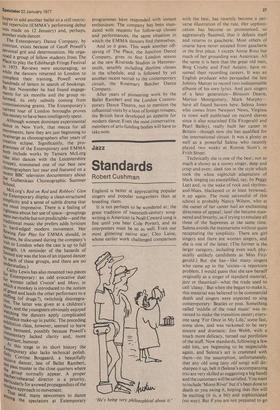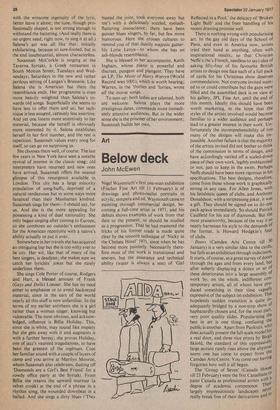Jazz
Standards
Robert Cushman
England is better at appreciating popular singers and popular songwriters than at breeding them.
It is not perhaps to be wondered at ; the great tradition of twentieth-century songwriting is American (a Noel Coward song is fine until you hear Cole Porter), and its interpreters must be so as well. Even our most glittering native star, Cleo Laine, whose earlier work challenged comparison
with the best, has recently become a perverse illustration of the rule. Her sophistication has become so pronounced, so aggressively flaunted, that it defeats itself and returns to gaucherie. Most others of course have never escaped from gaucherie in the first place. I except Annie Ross but much of her grounding was American. All the same it is here that the great old men, Bing Crosby and Fred Astaire, have resumed their recording careers. It was an English producer who persuaded the late Johnny Mercer to record two indispensable albums of his own lyrics. And jazz singers of a later generation—Blossom Deane, Marian Montgomery, Mark Murphy— have all found havens here. Salena Jones who comes from Newport News, Virginia (a town well publicised on record sleeves since it also nourished Ella Fitzgerald and Pearl Bailey), really built her career in Britain—though now she has qualified for the international circuit. It was a glossy as well as a powerful Salena who recently played two weeks at Ronnie Scott's in Frith Street.
Technically she is one of the best ; not so much a showy as a snowy singer, deep and crisp and even; sleek too in the style which took the white nightclub adaptation of black singing (as exemplified, say, by Peggy Lee) and, in the wake of rock and rhythmand-blues, blackened or at least browned, it up again. The most successful of this school is probably Nancy Wilson, who at the outset of her career had an enchanting directness of appeal; lateishe became mannered and breathy, as if trying to emulate all three of the Supremes at the same time. Salena avoids the mannerisms without quite recapturing the simplicity. There are girl singers and there are woman singers, and she is one of the latter. (The former is the larger category, including even such physically unlikely candidates as Miss Fitzgerald.) But she has—like many singers who came up in the :sixties—a repertoire problem. I would guess that she saw herself originally as a singer of standard material, jazz or theatrical—what the trade used to call 'classy.' But when she began to make it, this material was believed to be commercial death and singers were expected to sing contemporary: Beatles or post. Something called 'middle of the road music' was invented to make the transition easier; everyone sang 'For Once in My Life,' some fast, some slow, and was reckoned to be very sincere and dramatic. Jim Webb, with a touch more delicacy, turned out portfolios of the stuff. Now standards, following a few odd hits, are beginning to be respectable again, and Salena's act is crammed with them—on the assumption, unfortunately, that any old song (any old song) will do: sharpen it up, belt it (Salena's accompanying trio are very skilled at suggesting a big band) and the customers will be satisfied. You want to include 'Moon River' but it's been done to death so you swing it, hoping that this will be exciting (it is, a bit) and sophisticated (no way). But if you are not prepared to go
with the winsome ingenuity of the lyric, better leave it alone; the tune, though professionally shaped, is not strong enough to withstand the battering. (And really there is no urgent need, right now, to sing it at all.) Salena's act was all like that : initially exhilarating, because so sure-footed, but in the end insubstantial, almost characterless.
Susannah McCorkle is singing at the Taverna Syrtaki, a Greek restaurant in South Molton Street, Tuesdays and Wednesdays; Saturdays in the new and rather perilous setting of Langan's Brasserie, Like Salena she is American but there the resemblance ends. Her programme is even more heavily weighted than Salena's towards old songs. Superficially she seems to have less to offer them and us; her technique is less assured, certainly less assertive. And yet one listens more attentively to her material, because she herself is obviously more interested by it. Salena establishes herself in her first number, and the rest is repetition. Susannah values every song for itself, so can go on surprising us.
She chooses them well, of course. The last few years in New York have seen a notable revival of interest in the classic song; old interpreters have returned and new ones have arrived. Susannah offers the nearest glimpse of this resurgence available in London. This city has a large minority population of song-buffs, deprived of a natural rendezvous but in some ways more fanatical than their Manhattan kindred. Susannah sings for them—I should say, for us. And she is the more appealing for possessing a kind of dual nationality. She only began singing after coming to Europe, so she combines an outsider's enthusiasm for the American repertoire with a native's ability actually to put it over.
Somewhere in her travels she has acquired an intriguing lisp but he is too witty ever to be coy. Her wit, like that of many of the best singers, is deadpan; she makes sure we catch her lyricists' jokes but she rarely underlines them.
She sings Cole Porter of course, Rodgers and Hart, a blessed amount of Frank (Guys and Dolls) Loesser. She has no need either to emphasise or to avoid hackneyed material, since in the ears of the world nearly all this stuff is now unfamiliar. In the terms of my earlier antithesis she is a girl rather than a woman singer, knowing but vulnerable. The most obvious, and acknowledged, influence' is Billie Holiday. This, since she is white, may sound like impiety but she gets away with it and augments it with a further heresy; she proves Holiday, one of jazz's vaunted tragediennes, to have been the greatest of the ingenues. Coat her familiar sound with a couple of layers of camp and you arrive at 'Marilyn Monroe, whom Susannah also celebrates, dusting off 'Diamonds are a Girl's Best Friend' for a rowdy office party at the Syrtaki. From Billie she retains the upward murmur (a velvet croak) at the end of a phrase in a rhythm song, the wounded downbeat in a ballad. And she sings a dirty blues (`They busted the joint, took everyone away but me') with a deliciously sozzled, eyelashfluttering insouciance; there have been gutsier blues singers, by far, but few more humorous. Here she crosses cultures to remind you of that dustily majestic gutterlily Lotte Lenya—to whom she has an ash-blonde resemblance.
She is blessed in her accompanist, Keith Ingham, whose piano is powerful and discreet, pungent and plangent. They have an LP, The Music of Harry Warren (World Record WRS 1001), which is worth hearing; Warren, in the 'thirties and 'forties, wrote all the movie songs.
To sum up; both ladies are talented, both are welcome. Salena plays the more prestigious dates, commands more immediately attentive audiences. But in the wider sense she is the prisoner of her environment ; Susannah builds her own.



































 Previous page
Previous page